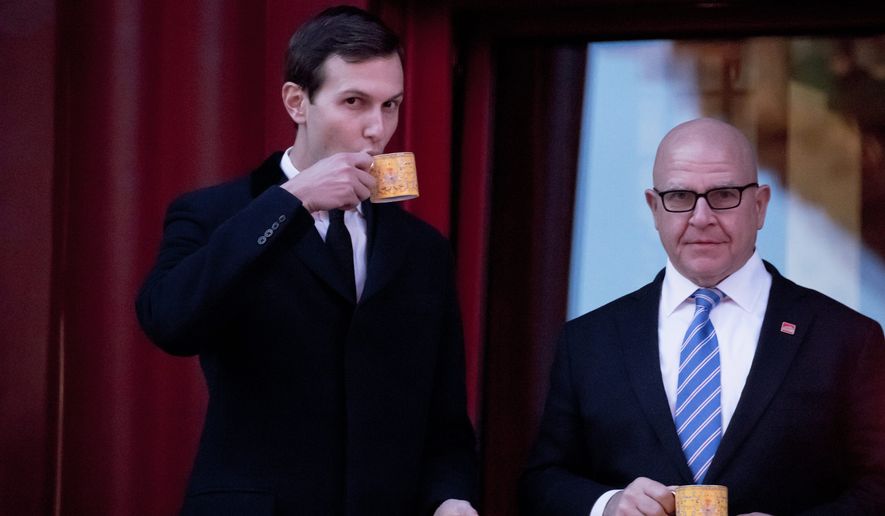China is running out of time to rein in its ally North Korea and its destabilizing actions across the region, President Trump’s national security adviser warned Tuesday.
China has publicly expressed reluctant support of a slew of new economic and political sanctions by the White House and the United Nations, geared toward derailing North Korea’s efforts to develop a long-range nuclear weapon. But Beijing has yet to apply the maximum amount of pressure on Pyongyang, National Security Adviser Lt. Gen. H.R. McMaster said Tuesday.
“Time is running out and they need to do more” to isolate and pressure the regime of North Korean President Kim Jung Un, Gen. McMaster said. “The time is now to do more [beyond] U.N. resolutions,” he added during a speech sponsored by the U.K.-based think tank Policy Exchange in Washington.
But that message was a bit muddled later in the day when Secretary of State Rex Tillerson said the Trump administration was now willing to have a “first meeting without preconditions” with North Korea, admitting in remarks to the Atlantic Council that it was “unrealistic” to expect the North to give up its nuclear and missile programs before direct negotiations can even begin.
“We are ready to talk anytime North Korea would like to talk. And we are ready to have the first meeting without preconditions,” Mr. Tillerson told the think tank.
Hours later, the White House took a harder line on the Kim regime without directly contradicting Mr. Tillerson’s statement.
“North Korea is acting in an unsafe way not only toward Japan, China, and South Korea, but the entire world. North Korea’s actions are not good for anyone and certainly not good for North Korea,” White House spokeswoman Sarah Sanders said in a statement, adding that the president’s views on the crisis “have not changed.”
President Trump has repeatedly called for Chinese President Xi Jinping to do more to tamp down tensions on the peninsula, while maintaining Washington will take all necessary actions to defend the U.S. and its allies. He has also publicly diverged from the diplomatic message Mr. Tillerson has offered.
The comments from Gen. McMaster and Mr. Tillerson come weeks after North Korea successfully executed a test launch of its newest long-range intercontinental ballistic missile. Last month’s test fire of the Hwasong-15 ICBM traveled higher than any previous missile test to date.
The launch, carried out from a North Korean weapons facility in Sain Ni, forced Japanese officials to put the country’s northern provinces located along the missile’s trajectory on high alert.
The Trump administration has reportedly weighed possible sanctions against the Chinese banks that continue to be Pyongyang’s financial lifeline, with the move gaining some traction among Republican lawmakers on Capitol Hill.
Yet Mr. Trump’s top aides have advised him to tread with “extreme caution” toward such a move because of fears among Wall Street investment firms that it would trigger a harsh backlash from Beijing, the Washington Times reported last month. China fears an abrupt collapse of the Kim regime could trigger a massive refugee crisis and potentially lead to a united Korea allied to the U.S. on its border.
Gen. McMaster sharpened his rhetoric over China’s dealings with North Korea, which is heavily dependent on Beijing for trade and energy.
The Trump White House “is not asking President Xi for a favor,” Gen. McMaster said. The North’s nuclear ambitions are not just a concern for Washington and its allies, but “it is a problem between North Korea and the world,” the three-star general said Tuesday.
British National Security Adviser Mark Sedwell said the North’s recent advances have magnified the scope of the crisis.
“An [intercontinental ballistic missile] that can reach the U.S. can reach Europe too,” said Mr. Sedwell. “It is a global problem.”
The Trump administration is poised to release its first-ever National Security Strategy on Monday, which will identify both China and Russia as “revisionist powers” whose actions are upending the global status quo.
Both countries, the three-star general said, “are undermining the international order and stability and they’re ignoring the sovereign rights of their neighbors and the rule of law.”
The Cold War “holiday” the U.S. took after the Soviet Union collapsed allowed powers like Russia and China to rise on the world stage, Gen. McMaster argued. But “geopolitics are back, and back with a vengeance,” he added.
In his remarks, Mr. Tillerson said the North would have hold off on its weapons testing if any talks were to proceed. He said President Trump remains committed to a diplomatic approach despite increasingly belligerent rhetoric on both sides.
“Let’s just meet and we can talk about the weather if you want to. We can talk about whether it’s a square table or a round table if that’s what you are excited about,” Mr. Tillerson said. “But can we at least sit down and see each other face to face and then we can begin to lay out a map, a road map, of what we might be willing to work towards.”
• S.A. Miller contributed to this report, which was based in part on wire service reports.
• Carlo Muñoz can be reached at cmunoz@washingtontimes.com.




Please read our comment policy before commenting.